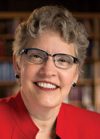- Thour Muy and his daughter, Sokhey Maudlin. Their family escaped the Khmer Rouge and settled in the U.S., thanks to Lutherans.
- An affirmation of baptism/confirmation project by Drew Fawcett of Gloria Dei Lutheran Church, St. Paul, Minn., traced the journey of his grandparents, who fled the killing fields of Southeast Asia.
Series editor’s note: At the 2016 ELCA Churchwide Assembly in August, the global dimensions of our self-understanding as “church” will be a major focus. This article helps us go deeper in pondering what it means to be members of the Lutheran World Federation. –Michael Cooper-White, president of the Lutheran Theological Seminary at Gettysburg (Pa.).
Her name is Sokhey (pronounced soak-eye) Muy. Her journey to the United States began years ago as a 4-year-old in a refugee camp sponsored by the Lutheran World Federation.
Sokhey’s father, Thour Muy, and his family were in a camp in Thailand after they escaped the Khmer Rouge regime, which is estimated to have killed as many as 2 million Cambodians during the late 1970s. One day her father grasped her hand and headed for a waiting bus. At last a pathway to a new life was opened for their family.
A Pennsylvania congregation had said yes to hosting a refugee family. Thour was delighted to end up in the U.S. since his oldest son, Chamroeun “Cham” Muy, had already made it to this country alone at age 20.
Cham had escaped Cambodia by himself with a small bag of belongings. He knew if he were caught in Thailand he would have been arrested. On one occasion during his escape, he slept on a bench and woke up to discover someone had stolen his shoes. So he walked on the hot ground with no shoes. He found work as a slave laborer in a restaurant and saw one of his friends who came to eat there. This friend connected Cham with the LWF-managed refugee camp, which eventually helped him on a path to a new life in Pennsylvania.
When Cham came to the U.S., one of his sponsors invited him to go shopping and urged him to pick out whatever he wanted. He chose one shirt and two pair of pants. It was the first time he had ever owned two pair of trousers. Cham later was issued several uniforms when he served in the U.S. Army.
On July 12, 1977, Sokhey and her family landed in Allentown, Pa. There they were welcomed by their congregational sponsors, who helped them get naturalization paperwork and support services. Their new Lutheran friends helped her father find a job and assisted the family with rent in their early years. Thour was so grateful that he was able to feed his family and have a safe place to live.
The Muys worked hard, saved and hoped to create a better life for themselves. They attended a Lutheran church in Allentown even though they couldn’t speak English.
Global communion—diakonia
A few days after a conversation with Sokhey Maudlin in April, I met high school student Drew Fawcett on his confirmation/affirmation of baptism day at Gloria Dei Lutheran Church in St. Paul, Minn.
For his confirmation project, Drew created a storyboard that recalled the journey of his grandparents, who also had fled the killing fields of Southeast Asia during the same period when Sokhey’s journey began.
In both of these recent encounters, I pondered how the LWF’s ministry of diakonia (“service” in Greek) makes a difference in the lives of individuals and congregations. I sensed overwhelming gratitude for those saints in congregations worldwide who together create pathways of hope made possible only through our global partnership in the LWF.
The LWF is a global communion of 143 member Christian church bodies in the Lutheran tradition. We exist in 79 countries and include 70.5 million Lutherans worldwide.
As the LWF general secretary, Martin Junge wrote in the preface for The Self Understanding of the Lutheran Communion: “As the Lutheran communion journeys toward the Reformation anniversary in 2017, the LWF wants to attest to what it means to be an ecclesial communion from a Lutheran perspective.”
Threefold commitment
When Sokhey was a high school sophomore, her family moved to Philadelphia, where she met her husband Eric Maudlin. They moved to Minnesota and are faithful members of St. Andrew Lutheran Church in Eden Prairie.
Reflecting on the long journey that brought her from the seemingly hopeless dead end of a Thai refugee camp, Sokhey notes that “being in the church helped us belong, gave us a second chance at life.”
Sokhey’s father-in-law serves on the board of Luther Seminary, St. Paul, Minn., which is how I first gained this particular glimpse into the LWF’s globe-spanning impact.
“I was a stranger and you welcomed me” (Matthew 25:35) is a familiar text to many. The priority of diakonia—service—to those in need, manifested in refugee support and so many other ways, is one of the threefold emphases of the LWF.
The second area of emphasis is “holistic mission,” which means “member churches that are growing in their capacity to carry out mission that includes proclamation of the gospel, service to the world and advocacy on behalf of the vulnerable ….”
“Theology and dialogue” is the third area of focus, wherein we deepen our biblical and doctrinal understandings within a richly diverse community of conversation partners.
For more information
See the Lutheran World Federation website for more stories about what it means to belong to a global communion and the impact your congregation makes.





